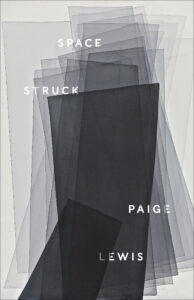by DEBORAH BACHARACH

Paige Lewis, Space Struck (Sarabande, 2019), pp. 78
This review was originally published in the Fall 2020 print issue of Carolina Quarterly.
Paige Lewis’ debut poetry collection, Space Struck, has a woman getting hit by a meteorite, celestial bodies making their case to humans, and God’s secretary setting us straight: “Get real darling. If He answered all prayers / you’d be dead five times over.” If that line strikes you as both funny and an uncomfortable truth you’re willing to hear, you’re reading the right book. Lewis, who currently lives and teaches in Indiana, opens with two epigrams. The first references Sibyl, the oracle cursed with eternal life who guides Aeneas into and out of the underworld. The second quote is from poet Lynn Xu, “I hear eternity / Is self-forgetting.” The two together seem like fair warning we are going to be taken on a dark journey.
On this trek, speakers struggle to connect. In the poem “You Be You and I’ll be Busy” the two people can’t seem to be in the same place calmly together whether it’s because they expect compliments, fail a personality quiz, or are as one is “chewing five sticks of Juicy Fruit, / turning my jaw into a clicking, pain- / pricked mess and reaching for another pack because hard work is defined by a body’s wreckage.” Trying to connect will inevitably wreck us, Lewis seems to warn us. There is a beloved in many of these poems, but romantic moments are undercut with a sardonic voice: “My beloved / is waiting to take me to the orchard, so we can / pay for the memory of having once, at dusk, / plucked real apples from real trees” (“On the Train, A Man Snatches My Book”). The speaker and the beloved connect, but only with the cynical understanding that connection occurs in a commercial and fabricated moment.
In a Lewis poem, paying attention reveals craziness and danger. In “Magic Show” a speaker concentrates on what the magician pulls from her throat starting with a reasonable and maybe even pretty “rope of knotted silk” until “she reaches in and brings / forth a crystal chandelier with its candles still lit.” Perhaps still pretty but beyond the real and extremely dangerous. In fact, in a horrible logic that I immediately recognized as real in my life, paying attention can actually create the danger. Lewis tells us, “We are only remembered as cruel when / what we harm does not die quickly.” So given this logic, the brother who swallowed the tadpoles is not cruel, but because Lewis has shone a light on this moment, it slows the moment down and thus becomes impossibly cruel. Lewis’ poems show us what is so hard to look at, the truth we squirm to see. And they make us culpable in the process.
In “Normal Everyday Creatures,” Lewis increases the reader’s culpability by using the second person. The “half / a yellow eye” you discover is part of an animal that because you have seen it into being now lives in your zoo and “Oh, of course your zoo will have cages!” If you hadn’t looked, maybe these animals would not be in cages, but that’s who you are and what happens when you look. The speaker in “Saccadic Masking” can’t see motion, so the purple finch becomes “stuck, burned / to the grill of my car.” Because of you seeing, because of how you see, cruelty ensues.
But even in all this cruelty and pain, there is humor. When the speaker in “On the Train, A Man Snatches My Book” says, “I’m / the vice president of panic, and the president is / missing,” I laughed out loud and winced because of the pain I knew was coming. In the second section of “In the Hands of Borrowers, Objects Are Twice as Likely to Break” the speaker tells us:
“My ghost drops by so often
I no longer feel obligated to offer
it our good coffee.”
The white space between stanzas acts like the delay before the punchline in a good joke. In “Turn Me Over, I’m Done on This Side” (already a joke about burning) the speaker draws attention to the humor/pain combination when they say, “I believe those who believe that the greatest comedians / are the ones who’ve suffered most. Saint Lawrence / cracked jokes while being roasted alive.” And this is the set up for the speaker telling us “my brother canoed into / a downed wire” which is another way to roast alive. Even in this horrific moment, the self-aware speaker keeps trying to make jokes. Lewis’ humor slides in horrors—the brother’s death, the extinction of species—the reader might recoil from if confronted directly. Lewis uses macabre humor to tell the truth, but tell it slant.

Like Saint Lawrence, holy and omniscient beings show up regularly in these poems, not really to the benefit of the humans. St. Francis takes up a lot of space in a studio apartment. In “God Stops By” the speaker tells us:
“When I was small, I was certain
that what was holy was mine—I caught
moths in the garden, pressed their wings
between my thickest book, and waited
for new moths to sprout up and out
of the pages. I ask God if He considers me
a cracked seed of grace. He says
Yes, dear.”
It’s a moment for the reader of being the innocent child who did not know better and the wiser observer outside the child watching in horror at the hubris that led to the inadvertent killing. Lewis, speaking from God’s voice, then makes a cutting joke.
In the poem that first drew me to Lewis, “You Can Take Off Your Sweater, I’ve Made Today Warm,” an omniscient speaker who has the power to control the weather tries to control a woman. Lewis uses meter and white space to show the tense relationship. The poem starts out in couplets of nine to twelve syllables each as the speaker patronizingly tells the woman sitting on the park bench how very lucky she is to have astronauts “quit their mission for you” but then the powerful speaker gets annoyed at the “small whelp of a woman! this is not / how we behave” who won’t follow directions. As the woman breaks the pattern that is imposed on her, the poem also breaks the pattern: no more couplets but lots of leaps into white space, into the unknown.
This book begins with a speaker promising to take us on a “journey / until we find the world in which we both fit” (“Normal Everyday Creatures”). But getting there is not going to be easy. In the second to last poem, “So You Want to Leave Purgatory,” the reader is commanded “Here take this knife.” If you do nothing, the calf with the rope around its neck will be choked by its own growth. And in the last line of the poem, the speaker is again commanded to take the knife. The guide can only take you so far. Lewis demands the reader act.

